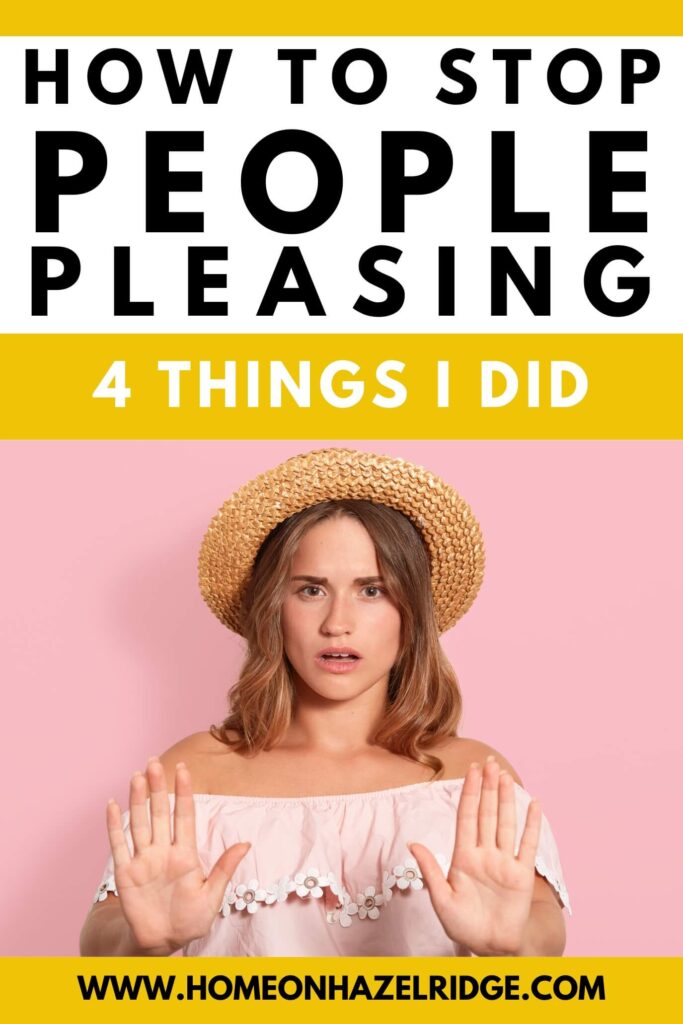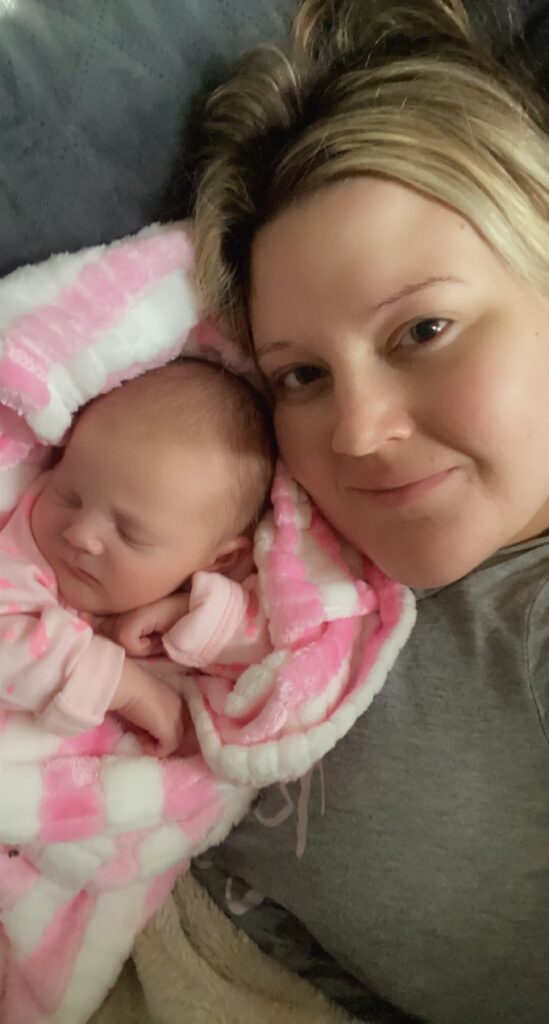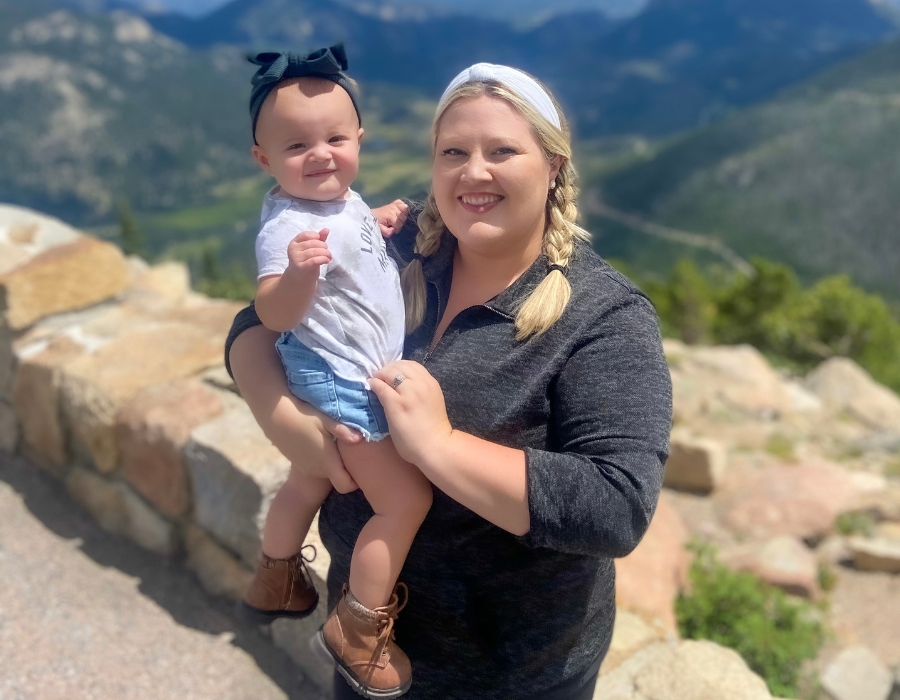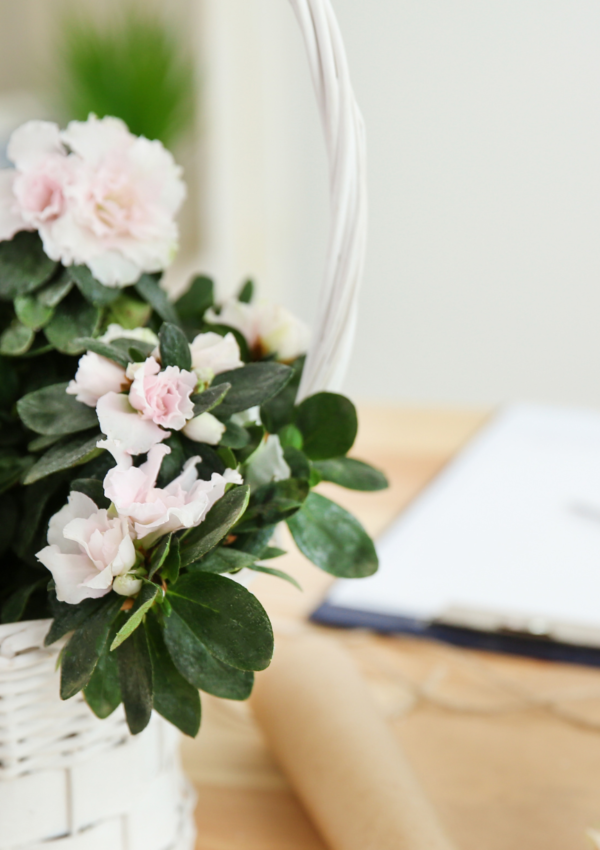How to stop being a people pleaser
What is people pleasing? It may be different from what you think…
Find this post helpful? Be sure to share or pin!
In this post, the author shares her experience of how to stop being a people pleaser by using four simple steps. Read to find out more and gain insight on how to overcome the habit and take control of your life.

Recently I discovered a podcast that talked about how to stop being a people pleaser. I’ve been a people-pleaser my whole life…until recently. I never understood the science behind it. Did you know that people-pleasing is actually a fear of rejection and a need for validation? Shocker.
Do you struggle with people-pleasing?
Here are some indicators that you might:
- People pleasing may have been rooted in childhood
- People pleasers often have anxiety
- People pleasers often have lower levels of self-esteem
- People pleasers often believe their worth is tied to the approval of others
I’ve always had a fear of rejection, so it made sense that I was trying to protect myself from the uncomfortable feeling that it gave me by avoiding confrontation and conflict.
Now, I wasn’t like this all the time. If I felt extremely passionate about a topic or I felt completely disrespected, I would stand up for myself. But for the most part, I always tried to keep the boat steady when it came to agreeing with others before I learned to overcome my people-pleasing habit.

Why did I want to stop people pleasing?
When I became a mother, I realized that I had to start putting myself first so I had the mental capacity to show up as the best version of myself for my family. This meant that I had to get comfortable with saying “no” and quit doing things just because I thought other people wanted me to do them.
This was a big change for me, and it took some self-discovery. It also took some willpower.


To say you want to stop people pleasing doesn’t mean you want to stop being kind. It doesn’t mean that you aren’t there for others, and it doesn’t mean that you are selfish. It simply means that you are now listening to your own body, mind, and spirit and making decisions that align with the authentic version of you.
Pin this list!
I love helping people. I love making others feel important and special, but I also knew that I deserved that same validation from myself, and something had to change.
I once read that you should give advice to yourself the same way that you would a friend, and that totally changed my perspective.
“It doesn’t mean that you aren’t there for others, and it doesn’t mean that you are selfish. It simply means that you are now listening to your own body, mind, and spirit and making decisions that align with the authentic version of you.”
– Ciara Hunter
In a nutshell, here are four things I have done since learning how to escape the draining feeling of being a chronic people pleaser. I highly encourage you to read if it is something you struggle with as well!
1. I learned the science behind people pleasing

By Merriam-Webster’s definition, a people pleaser is “a person who has an emotional need to please others often at the expense of his or her own needs or desires.” People pleasers have a strong desire for outside validation and are sensitive to conflict.

Learning this was life-changing for me and it all started to change when I quit needing outside validation. I needed to learn how to validate myself.
“These people have a strong desire for external validation and avoid, or are sensitive to, situations where conflict may arise.”
Heather Hayes – Licensed Counselor, Board Registered Interventionist (CIP)
Here are a couple of best-selling books on overcoming people-pleasing and learning how to validate yourself. The more time I spent reading about it and listening to experts on the topic, the easier it came for me to overcome the habit.
Need ideas?
Check out these best-selling books on overcoming people-pleasing.

“A fascinating book… If you struggle with where, when, and how to draw the line between your own desires and the demands of others, buy this book!” Kay Redfield Jamison, bestselling author of An Unquiet Mind and Night Falls Fast
People pleasers are not just nice people who go overboard trying to make everyone happy. Those who suffer from the Disease to Please are people who say “Yes” when they really want to say “No.”
In this book, psychotherapist Emma Reed Turrell teaches the different ‘types’ of people-pleasers and gives advice on how to better understand and ultimately stop people-pleasing behavior when you start to neglect your own needs.
Please Yourself will help you care for others in the right way – and ultimately, help you take better care of yourself.

2. I paid attention to how I felt and voiced my ideas

Have you ever been out with a group of people trying to figure out where to eat? I was always that person that just agreed with whatever was said and never put my own opinions out there.
“I don’t care! I’ll eat whatever!” is a typical thing I used to say. (Except not Long John Silvers…no thanks.) That is such a small thing, but it is a sign of people pleasing.
I even used to go as far as canceling my own plans in order to do whatever another person asked me to do. I always put my needs behind because I didn’t want to upset the other person. I didn’t understand what I was actually doing at the time.
I don’t do that anymore. I voice my opinions, wants, and desires, and I realized that my opinions are just as important as anyone else’s. It’s really that simple! I quit caring about the approval of others and I started living for my approval of myself. It’s really a freeing feeling.

Life is short. I learned that if I want to life authentically and make the most out of my own life, I had to start listening to my own intuition, follow my own dreams, and speak my own mind. It takes learning the skill of confidence, which is something that you aquire, not something that you are born with, and understanding that helped me so much.
3. I valued my own time and set boundaries

One of the most significant changes I made was learning to value my own time. I began to understand that my time was valuable and that I had the right to say no to things that didn’t align with my priorities.
In this video, the speaker shares how you can set boundaries and learn to say “no.”
When I started working from home, I think I gave off the idea that I was available 24/7. But the reality is, I had to set boundaries with my time for myself to work and to take care of my daughter. People may not always understand my need for this, but that’s okay. I understand it.
Ways I started setting boundaries:
- Setting times for visiting with people
- Replying to texts and calls on my own time
- Setting work hours and planning around those hours
- Prioritizing time alone to reenergize
- Letting go of the guilt
By prioritizing my own time, I was able to focus on the things that were important to me and avoid burnout, something I knew all too well from being a teacher. It also allowed me to build stronger relationships with the people in my life by being fully present when I was with them.
“Setting boundaries allowed me to build stronger relationships with the people in my life by being fully present when I was with them.”
4. Set plans for checking in with other people

While it’s essential to prioritize your own needs, it’s also important to maintain healthy relationships with the people in your life. I realized that when I was stretched too thin, I didn’t want to make plans with other people. That was a problem.
So I took control of myself and prioritized my needs so that I could feel energized and give to other people. When I felt better myself, I showed up better for others.

By scheduling regular check-ins with friends and loved ones, you can stay connected and communicate your needs and boundaries effectively. This can help you avoid feelings of guilt or anxiety when saying no to requests that you may want to do, but you just aren’t able to do them.
In Conclusion
In conclusion, overcoming people-pleasing is a journey that requires self-reflection, self-care, and self-compassion. I highly suggest checking out The Mel Robbins podcast. She touches on so many topics similar to this one, and listening to her each day has been life-changing.
By understanding the science behind people pleasing, realizing the importance of your own needs, valuing your own time, and setting plans for checking in with others, you can begin to break free from this behavior and build greater self-esteem and confidence and ultimately learn how to stop being a people pleaser.
Remember, progress takes time to learn how to stop being a people pleaser and it’s essential to celebrate the small wins along the way.
If you resonated with this post, please let me know by commenting below or messaging me on Instagram. Don’t forget to share if it was helpful to you!
Other posts by Ciara
- From Nostalgia to New: Renovating My 1993 Fisher-Price Dollhouse for My Daughter 30 Years Later
- Three Under the Sea: Creating a Special Third Birthday
- A Day at Disney’s Magic Kingdom: First Family Trip
- Beautiful Minnie Mouse Birthday Party for a Two-Year-Old
- Creating a Schoolhouse Area in the Playroom Using Amazon Products







I absolutely love this article and can relate to it. I’m a former people pleaser (still working on it) and I’m a licensed clinical social worker who helps people with depression/anxiety navigate their emotional ups and downs. I love that you highlight “saying no” which is a BIG one for people pleasers! I even wrote a whole article on it https://pantearahimian.com/how-to-say-no-without-feeling-guilty-6-secrets-from-an-expert/
I love your article, it’s speaks volumes because I never realized I was a people pleaser. I’ve always had a hard time of saying no.
I have been a people-pleaser for a long time too. For me, being married has helped a lot. I still struggle of course, but I think having a rational force that I know is seeking my best interest is really helpful when it comes to battling people-pleasing. Thanks for the tips!!
I love this post. I’ve been a people pleaser my entire life. I appreciate all the points you make and will do my best to implement them in my own life. Thank you for sharing!
wow this article so got me! I did this for so long and it’s was so hard to do. Thank you for the tips to keep going!